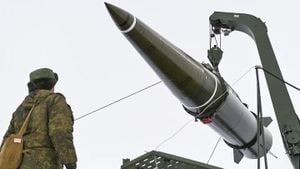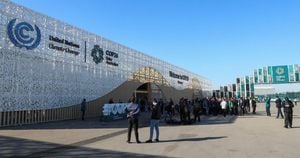International Finance Corporation (IFC), part of the World Bank Group, has made headlines with its record investment of $12.2 billion across 123 projects in the Asia Pacific region for the fiscal year ending June 30. This marks an impressive 11% increase from the previous fiscal year, showcasing IFC's commitment to addressing pressing development challenges and supporting sustainable development initiatives.
During this period, IFC mobilized $6.2 billion from its own account for long-term financing, $3.3 billion for mobilization efforts, and $2.7 billion for short-term trade and supply-chain finance. These investments span various sectors, focusing on alleviating issues such as climate change, gender inequality, food insecurity, and financial inclusion.
The impact of IFC's investments is expected to be significant, with estimations indicating the creation of up to 570,000 direct and indirect jobs across the region. This impressive figure highlights the potential of well-directed private sector investment to serve as a powerful engine for economic development and poverty alleviation.
Riccardo Puliti, IFC's Regional Vice President for Asia Pacific, emphasized the organization's dedication to fostering innovation, stating, "The private sector continues to play a key role in addressing urgent development needs of countries in the region. Our projects this last financial year reinforce IFC’s commitment to offering targeted solutions implemented at scale to maximize impact, improving lives and livelihoods throughout Asia Pacific.”
Among the notable projects funded by IFC are initiatives aimed at combating climate change. Approximately 36% of long-term financing came from projects addressing this global concern, including the financing of the first phase of the Yondr Group's data center, strategically located at Sedenak Tech Park, Johor Bahru. This significant investment not only promotes technological advancement but also aligns with sustainability goals by focusing on energy efficiency.
IFC has also made strides toward improving access to finance for micro, small, and medium-sized enterprises (MSMEs). Through financing and advisory services provided to financial institutions, the organization anticipates facilitating over two million loans, thereby tackling the financial barriers often faced by smaller businesses. This is particularly relevant for regions where such access to finance is scarce.
Gender inclusivity remains another cornerstone of IFC's investment strategy, with 52% of long-term financing projects directed at improving gender equality. For example, as highlighted by IFC's efforts, investments included backing the initial public offering of a Thai bank, aimed at developing new products for smaller businesses owned or led by women. This not only supports female entrepreneurs but also drives the broader effort of integrating gender equality within economic growth.
IFC's commitment to supporting vulnerable populations is evident, with 26% of the long-term projects targeting low-income and fragile countries. Noteworthy initiatives include Bangladesh's first-ever housing bond aimed at improving affordable housing for women, as well as programs to help women excel professionally, particularly where they have historically been underrepresented, such as Papua New Guinea.
Among the diverse range of financing initiatives, IFC has also ventured successfully outside traditional financing methods. An example of this is their recent mezzanine equity investment structure used to fund an Indonesian ride-hailing and e-commerce company. This innovative financing technique aims to bridge gaps within the digital economy and allow broader access to services for consumers across Indonesia.
IFC's foresight extends to aiding sectors heavily impacted by economic disturbances, such as the pharmaceutical and food processing industries. The organization has launched flexible U.S. dollar-denominated working capital loans to address foreign exchange shortages, particularly within Bangladesh. Here, the efforts are not simply about investment; they also focus on strengthening supply chains to build resilience and create sustainable pathways for growth.
The pharmaceutical sector has also witnessed support from IFC, as the organization aims to bolster healthcare access and resilience through investments aimed at increasing capacity and retail operations. Similar initiatives have been implemented to expand pharmaceutical manufacturing capabilities, thereby ensuring local communities have sustainable access to necessary healthcare services.
Through its extensive portfolio of projects, IFC is not only working to combat immediate economic challenges but also ensuring long-term sustainability and resilience within the Asia Pacific region. By directly tackling issues like food security, employment generation, and financial inclusion, IFC continues to play a pivotal role to align private sector growth with the broader goals of sustainable development.
The investments made by IFC reflect its long-term vision for the Asia Pacific region, showcasing how targeted financial solutions can create substantial social impact. These efforts are not just financial transactions; they embody IFC’s commitment to being part of the solution to some of the region's most pressing challenges.



